新概念英语 第一册 第133-135课 语法:直引变间引
新概念英语第1册Lesson135~140重要语法(最新)
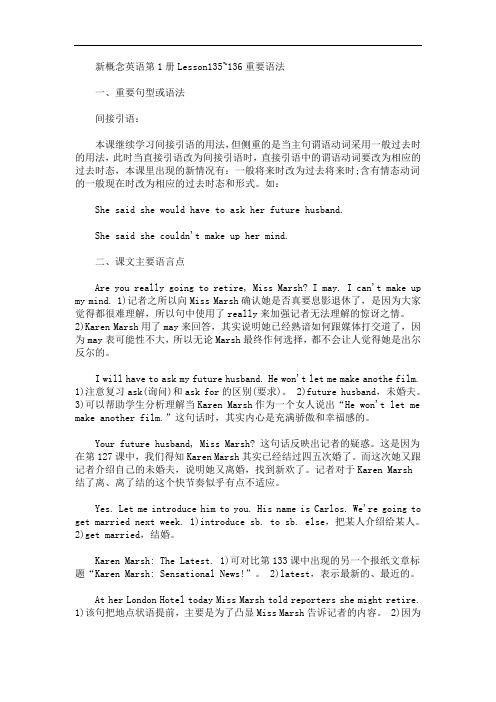
新概念英语第1册Lesson135~136重要语法一、重要句型或语法间接引语:本课继续学习间接引语的用法,但侧重的是当主句谓语动词采用一般过去时的用法,此时当直接引语改为间接引语时,直接引语中的谓语动词要改为相应的过去时态,本课里出现的新情况有:一般将来时改为过去将来时;含有情态动词的一般现在时改为相应的过去时态和形式。
如:She said she would have to ask her future husband.She said she couldn't make up her mind.二、课文主要语言点Are you really going to retire, Miss Marsh? I may. I can't make up my mind. 1)记者之所以向Miss Marsh确认她是否真要息影退休了,是因为大家觉得都很难理解,所以句中使用了really来加强记者无法理解的惊讶之情。
2)Karen Marsh用了may来回答,其实说明她已经熟谙如何跟媒体打交道了,因为may表可能性不大,所以无论Marsh最终作何选择,都不会让人觉得她是出尔反尔的。
I will have to ask my future husband. He won't let me make anothe film.1)注意复习ask(询问)和ask for的区别(要求)。
2)future husband,未婚夫。
3)可以帮助学生分析理解当Karen Marsh作为一个女人说出“He won't let me make another film.”这句话时,其实内心是充满骄傲和幸福感的。
Your future husband, Miss Marsh? 这句话反映出记者的疑惑。
这是因为在第127课中,我们得知Karen Marsh其实已经结过四五次婚了。
而这次她又跟记者介绍自己的未婚夫,说明她又离婚,找到新欢了。
新概念英语第一册语法总结:直接引语间接引语
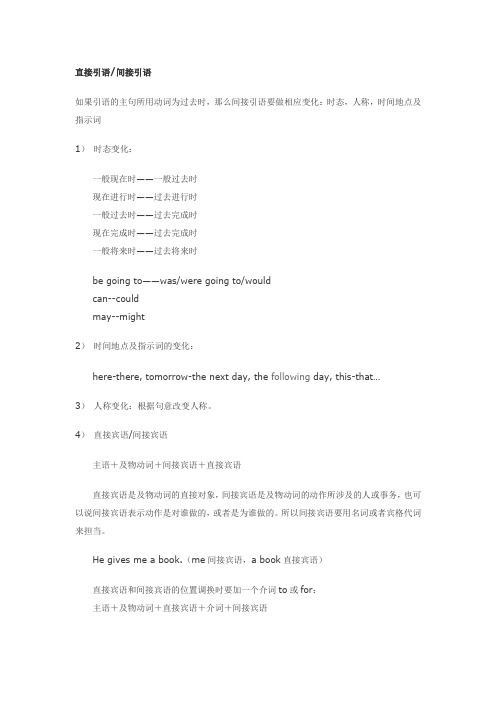
直接引语/间接引语
如果引语的主句所用动词为过去时,那么间接引语要做相应变化:时态,人称,时间地点及指示词
1)时态变化:
一般现在时——一般过去时
现在进行时——过去进行时
一般过去时——过去完成时
现在完成时——过去完成时
一般将来时——过去将来时
be going to——was/were going to/would
can--could
may--might
2)时间地点及指示词的变化:
here-there, tomorrow-the next day, the following day, this-that…
3)人称变化:根据句意改变人称。
4)直接宾语/间接宾语
主语+及物动词+间接宾语+直接宾语
直接宾语是及物动词的直接对象,间接宾语是及物动词的动作所涉及的人或事务,也可以说间接宾语表示动作是对谁做的,或者是为谁做的。
所以间接宾语要用名词或者宾格代词来担当。
He gives me a book.(me间接宾语,a book直接宾语)
直接宾语和间接宾语的位置调换时要加一个介词to或for:
主语+及物动词+直接宾语+介词+间接宾语
Give me a book. = Give the book to me.
Send him a letter. = Send a letter to him.
Show him the new dress. = Show the new dress to him.。
新概念英语第一册133-134课(共22张PPT)

• ★retire: • v. 退休 • retire from:从…上退休 • adj. retired 退休的 • retired workers 退休工人
Page 6
Mink coat [miŋk] 貂皮大衣
•arrive in(大地方) •arrive at(小地方)
Sensational news: Director Zhang said he was going to retire.
Listen and answer
1.Who is Miss Marsh? 2.Has she made a new film? 3.Is she going to make a film? 4.Where did Miss Marsh arrive? 5.What was Miss Marsh wearing?
直接引语间接引语?一般现在时一般过去时?一般过去时过去完成时?现在完成时过去完成时?现在进行时过去进行时?一般将来时过去将来时间接引语时间状语和地点状语的变化
Lesson 133-134. Sensational news!
爆炸性新闻!
主要语法点: He said (that) he…他曾说他… He told me (that) he…他曾告诉我说他…
She was wearing a blue dress. wear v. 穿(状态) wear the uniform
put on 穿(动作)
be in +颜色 穿什么颜色的衣服
dress v. 穿(某人) dress oneself 自己穿衣服
Finish the story
Alan Jones, a reporter from CNN is visiting the famous director Karen Marsh in _mink coat (貂皮大衣).
新概念一135,136知识点整理

5.She said she would have to ask her future husband.
6.They would get married next week.
7.That’s sensational news, isn’t it?
introduce......to......把……介绍
let sb. do…..让某人做某事
经典句型
1.I can't make up my mind.
2.I will have to ask my future husband.
3.He won’t let me make another film.
C.现在完成时→过去完成时
He said: “Ihave finishedmy homework.” / He said that hehad finishedhis homework.
D.一般将来时→过去将来时
Linda said, “I’ll doit after class.” / Linda said that shewould doit after class.
this week ( month, etc.)--- that week (month, etc.)
yesterday --- the day before
three days (years, etc.) --- three days (years, etc.)
tomorrow --- the next/ following day
一般将来时
过去将来时
一般过去时
过去完成时
过去完成时
过去完成时
新概念英语第一册135 136课语法部分

? I have been married for 14 months.
? She said she couldn't make up her mind. She said she would have to ask her future husband. She said her future husband would not let her make another film.
? 第三:指示代词、时间状语、地点状语和 动词的变化。
直接引语 间接引语
直接引语 间接引语
地点状语 here
动词
come
there go
时间状语 yesterday the day before
today that day
指示代词 this these
that those
tomorrow the next day
? 如果她继续那样工作下去,一定会生病的
? She will certainly become ill if she goes on working like that.
重点:直接引语与间接引语的问题
? 直接引语与间接引语相互转化时应注意的 问题:
? 第一:人称的变化。 ? 第二:时态变化。 ? 直接引语变间接引语时,间接引语的时态
Welcome to New Concept English Class
Lesson 135 The latest report
语法部分
? really 真的,确实,加强语气 ? 尝尝这个酒,真的很好喝 ? 试一试:Try this wine , it is really delicious. ? I may. I can't make up my mind. ? make up one's mind 拿定主意,做出决定 ? make up one's mind=decide ? 他们下决心要把房子卖掉。 ? 试一试: They made up their minds to sell
新概念英语第1册第135-136课重点语法
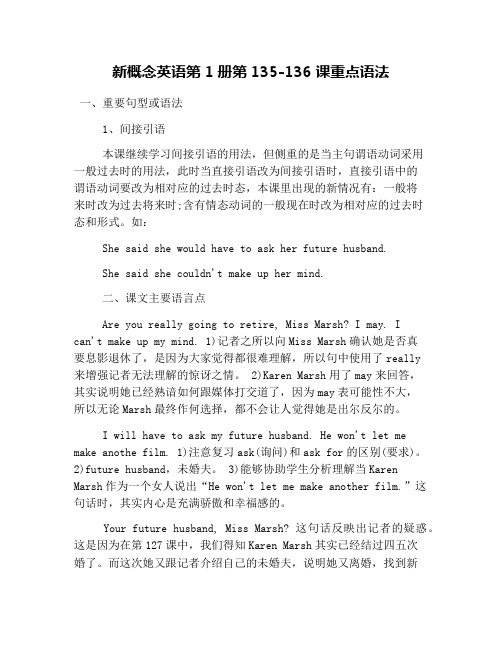
新概念英语第1册第135-136课重点语法一、重要句型或语法1、间接引语本课继续学习间接引语的用法,但侧重的是当主句谓语动词采用一般过去时的用法,此时当直接引语改为间接引语时,直接引语中的谓语动词要改为相对应的过去时态,本课里出现的新情况有:一般将来时改为过去将来时;含有情态动词的一般现在时改为相对应的过去时态和形式。
如:She said she would have to ask her future husband.She said she couldn't make up her mind.二、课文主要语言点Are you really going to retire, Miss Marsh? I may. Ican't make up my mind. 1)记者之所以向Miss Marsh确认她是否真要息影退休了,是因为大家觉得都很难理解,所以句中使用了really来增强记者无法理解的惊讶之情。
2)Karen Marsh用了may来回答,其实说明她已经熟谙如何跟媒体打交道了,因为may表可能性不大,所以无论Marsh最终作何选择,都不会让人觉得她是出尔反尔的。
I will have to ask my future husband. He won't let me make anothe film. 1)注意复习ask(询问)和ask for的区别(要求)。
2)future husband,未婚夫。
3)能够协助学生分析理解当Karen Marsh作为一个女人说出“He won't let me make another film.”这句话时,其实内心是充满骄傲和幸福感的。
Your future husband, Miss Marsh? 这句话反映出记者的疑惑。
这是因为在第127课中,我们得知Karen Marsh其实已经结过四五次婚了。
而这次她又跟记者介绍自己的未婚夫,说明她又离婚,找到新欢了。
2020最新新概念英语第一册Lesson133~138语法及单词解析

新概念英语第一册Lesson133~134语法及单词解析语法 Grammar in use需改变时态的间接陈述句间接引语里常要改变时态,这是因为原来讲的话与转述这些话之间有一段间隔。
选择哪种恰当的形式取决于转述者的着眼点。
在间接引语里通常并不确切地重复讲话者说过的话。
转述通常发生在过去,所以引述动词通常是过去时。
因此,转述时从句的时态通常要“往回移”(back shift)。
一条普遍的规则是:现在时变为过去时,过去时变为过去完成时。
为过去时的情态助动词和过去完成时在转述时不变,因为不可能再往回移了。
使用间接引语主要是为了简洁、紧凑地把说话内容转述给第3者。
请看下面直接引语变成间接引语时在时态等方面必须作出的相应变化:(1)一般现在时改为一般过去时:‘I'm thirsty,’she said.“我渴了”她说。
She said (that) she was thirsty.她说她渴了。
(2)现在进行时改为过去进行时:‘I'm having a rest,’ she told them.“我正在休息”她告诉他们。
She told them (that) she was having a rest.她告诉他们说她当时正在休息。
(3)现在完成时改成过去完成时:‘I've just made a new film,’ she told me.“我刚完成一部新电影”她告诉我。
She told me(that) she had just made a new film.她告诉我说她刚完成一部新影片。
(4)一般将来时改成过去将来时(一般用would +动词原形):‘I'll have to ask my husband,’she said.“我得问问我丈夫”她说。
She said (that) she would have to ask her husband. 她说她将得去问问她丈夫。
新概念英语第一册第133135课语法直引变间引
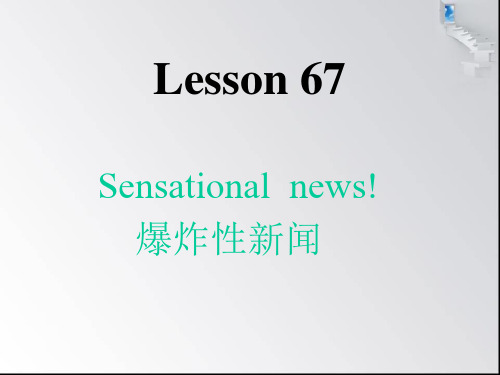
一般疑问句
用连词whether或if引导,原主句中谓语动词say 要改为ask ,语序要变为陈述语序
• He said, “Do you have any difficulty with pronunciation?”
train. • “Is he all right?”They cried out. • They cried out whether he was all right.
直接变间语中,要注意情太动词的变化 can – could
can’t – couldn’t will – would may – might
• You look great in the mink coat. • 你穿那件貂皮大衣看起来棒极了。
• wonder [‘wʌndə] v.1.感到好奇
•
2.感到惊讶
• I wonder why.
• 我想知道为什么。
• She wonders at his rudeness.
• 她对他的无礼感到惊讶。
Summary:
reporter sensational
mink coat wonderቤተ መጻሕፍቲ ባይዱ
直接引语变间接引语
1)人称的变化 一随主,二随宾,三不变
口诀
说明
直接引语
间接引语
一 随 主
引号内的第一人 称变间引后与主 句主语的人称保 持一致
She said,“ I like She said that she
直接引语变间接引语可分为三大类:
1)直接引语为陈述句 2)直接引语为疑问句(一般疑问句、特殊 疑问句) 3)直接引语为祈使句
新概念英语第一册第135-136课

3). marry +状语:
She married young / early. 她很早就结婚了。 She married late (in life). 她结婚晚。 She married well. =She married a rich man. 她嫁给了一个有钱人。 直到50岁她才结婚。 She didn’t get married until 50. She never married in life. 她一生未嫁。
He asked
if/whether I was interested in Maths.
试一试
1、我知道你是对的。 I know/knew that you are/were right.
2、Mary告诉我她已经完成了家庭作业。 Mary told me that she had already done her homework.
直接引语改间接引语
(3)情态动词由现在时改成过去时态: ‘I can see you tomorrow,' she said. She said (that) she could see me the next day.
‘I'll help you,’ she said. She said (that) she would help me.
He told the children to
stop making so much noise.
3. “Don’t tell him the news.” she said.
新概念英语第一册lesson135-136
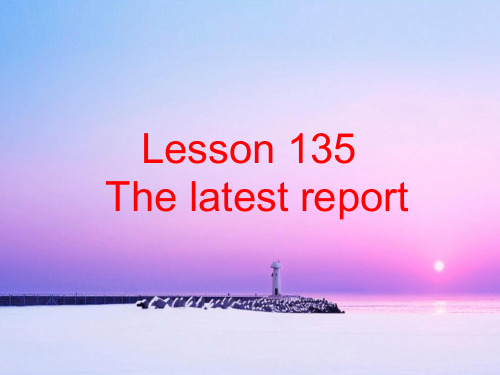
Listen and Answer
1.Has Karen Marsh made up her mind to retire? No, she hasn't.She can't make up her mind.
2.Who does she say she'll have to ask? She says she'll have to ask her future husband.
凯 特:当然啦。他将是她的第6个丈夫!
Grammar
直接引语变间接引语时态保持不变的情况
①直接引语是客观真理。
"The earth moves around the sun and the moon moves around the earth,” the teacher told me.
→The teacher told me the earth moves around the sun and the moon moves around the earth.
Fill in the blanks.
REPORTER:Are you really going to retire, Miss Marsh? MISS MARSH:I may. I can't make up my mind. I will have to ask my future husband. He won't let me make another film. REPORTER:Your future husband, Miss Marsh? MISS MARSH:Yes. Let me introduce him to you. His name is Carlos. We're going to get
新概念英语第一册第131-132课重点语法

⼀、重要语法 1、情态动词 本课是有关情态动词may的⽤法的,它可以⽤来表⽰对过去、现在和将来时间发⽣的动作或状态的猜测。
如: We may go abroad. (将来) It may be cheaper. (现在) He may have been busy. (过去) ⼆、课⽂主要语⾔点 Where are you going to spend your holidays this year, Gary?1)可复习⼀下be going to do和will do的区别。
2)注意spend 的⽤法:spend sth. on sth. / (in) doing sth. We may go abroad. I'm not sure.1)注意may表⽰猜测时,可能性较⼩,所以Gary接着补充了I'm not sure。
2)go abroad,去国外。
注意提醒学⽣abroad的拼写,很容易被误拼为:abraod。
My wife wants to go to Egypt. I'd like to go there, too. We can't make up our minds.1)注意Egypt的拼写和发⾳。
2)make up one's mind,下定决⼼。
Will you travel by sea or by air? We may travel by sea.1)注意选择疑问句的回答不能⽤Yes/No。
2)可复习⼀下交通⼯具的介词⽤法,除了on foot,其他的⼀般都⽤by。
注意by sea相当于by ship,by air相当于by plane。
介词和交通⼯具间不能插⼊任何成分。
It's cheaper, isn't it? It may be cheaper, but it takes a long time.1)句中使⽤cheaper,其实是在⽐较by sea和by air的价格。
新概念英语第一册135-136课语法部分
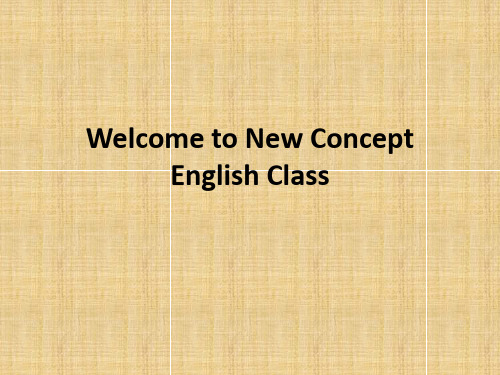
ago
before
• 第四:句式上的变化
• 1.陈述句变间接引语时,用that连接。
• She said:" I am a girl." She said that she was a girl. (that可以省略)
• 2.一般疑问句,选择疑问句和反意疑问句变 间接引语时,用连词if或whether引导,使 用陈述语序。
• 4.祈使句变间接引语,用tell (ask, order, beg 等) sb (not) to do sth.句型
• He said to her:" Don't take the book away." He asked her not to take the book away.
• She will certainly become ill if she goes on working like that.
重点:直接引语与间接引语的问题
• 直接引语与间接引语相互转化时应注意的问题:
• 第一:人称的变化。 • 第二:时态变化。 • 直接引语变间接引语时,间接引语的时态
要与主句的时态一致。
直接引语 一般现在时 一般过去时 现在进行时 一般将来时 现在完成时
间接引语 一般过去时 过去完成时 过去进行时 过去将来时 过去完成时
• 注意:
• 1.直接引语为客观真理时,间接引语仍用一般现 在时。
• Teacher told us:" The moon moves round the earth." Teacher told us the moon moves round the earth.
• 翻译:我结婚14年了。
新概念英语第一册135-136课语法部分
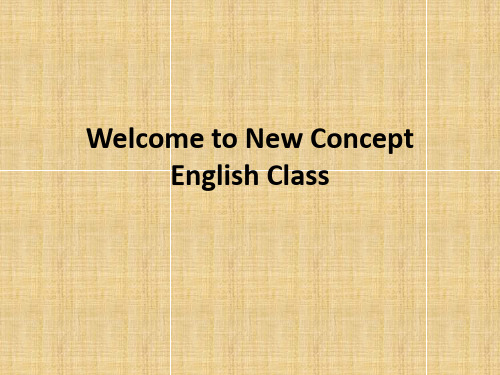
• • • • • • •
future husband 未婚夫 记一记:let sb do sth 让(允许)某人做某事 相当于allow sb to do sth 允许某人做某事 翻译:Just let me try! 就让我试试吧! 试一试:她的父母不会让她和那个男孩出去的。 Her parents wouldn’t let her go out with that boy.
• 翻译:你结婚了吗?
• Are you married?
• 翻译:你什么时候结的婚?
• When did you get married?
• 翻译:我去年结的婚
• I got married last year.
• 翻译:你结婚多少年了?
• How long have you been married?
• 注意:
• 1.直接引语为客观真理时,间接引语仍用一般现 在时。 • Teacher told us:" The moon moves round the earth." Teacher told us the moon moves round the earth. • 2.直接引语为一般过去时并且与具体时间状语连 用时,间接引语仍用一般过去时。 • She said:" I went to England in 1998." She said she went to England in 1998. • 3.主句为现在时,间接引语时态不变。 • He says:" I bought you a book yesterday." He says that he bought me a book yesterห้องสมุดไป่ตู้ay.
新概念英语第一册 Lesson 135 笔记说课讲解
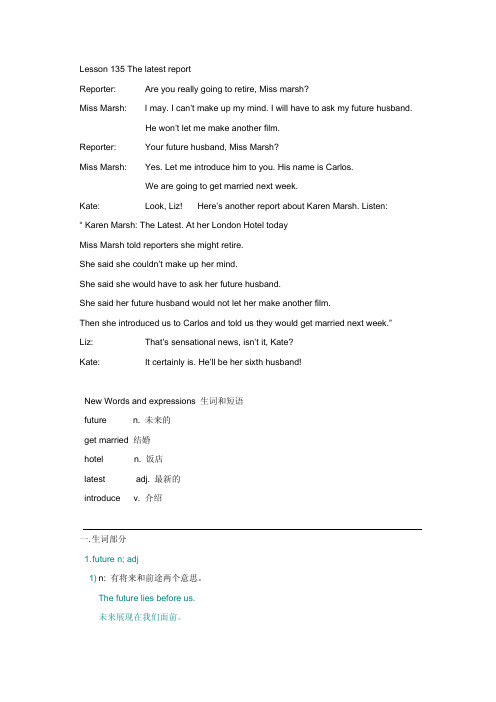
Lesson 135 The latest reportReporter: Are you really going to retire, Miss marsh?Miss Marsh: I may. I can’t make up my mind. I will have to ask my future husband. He won’t let me make another film.Reporter: Your future husband, Miss Marsh?Miss Marsh: Yes. Let me introduce him to you. His name is Carlos.We are going to get married next week.Kate: Look, Liz! Here’s another report about Karen Marsh. Listen:“ Karen Marsh: The Latest. At her London Hotel todayMiss Marsh told reporters she might retire.She said she couldn’t make up her mind.She said she would have to ask her future husband.She said her future husband would not let her make another film.Then she introduced us to Carlos and told us they would get married next week.”Liz: That’s sensational news, isn’t it, Kate?Kate: It certainly is. He’ll be her sixth husband!New Words and expressions 生词和短语future n. 未来的get married 结婚hotel n. 饭店latest adj. 最新的introduce v. 介绍一.生词部分1. f uture n; adj1) n: 有将来和前途两个意思。
新概念一册Lesson135语法
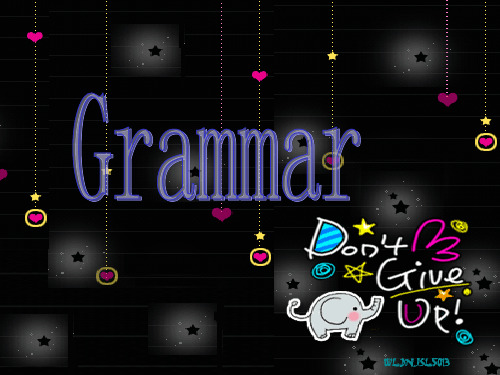
4. 时态的变化 1) 当主语的谓语动词(引述动词)为 一般现在时时, 间接引语动词的 时态不变。 2) 当主语的谓语动词(引述动词)为 一般过去时时,间接引语的时态 要做相应的改变。
直接引语 一般现在时 现在进行时 现在完成时 一般过去时 一般将来时 can , may , must
间接引语 一般过去时 过去进行时 过去完成时 过去完成时 过去将来时
直接引语变间接引语
1.Jane said to Tom, “I love you” Jane said to Tom that she loved him. 2.Tom said: “I am writing a letter” Tom said that he was writing a letter.-- that day come--- go now ---- then this week ---- that week
tomorrow ---- the next day bring ---- take three days ago ---- three days before
一、 直接引语 直接引语就是直接引用别人的原话,并 在原话前后加引号。 二、间接引语 间接引语就是用自己的话转述别人的 话,多数以宾语从句的形式出现,不加 引号,而多用that等引导宾语从句。
eg: He says that he likes English very much. 三、直接引语变间接引语 1. 人称代词及物主代词的变化 “一随主,二随宾,三不变” 2. 指示代词的变化 this---that these----those
5.Tom said : “I told him to drive carefully” Tom said that he had told him to drive carefully.
新概念英语第一册:133-134课语法及单词解析

【导语】新概念⼀共144课,其中单课为课⽂,双课为语法和练习。
整本书是以单数课为正课,并附带有插图⽽双数课则是针对单数课所讲的内容有针对性地进⾏练习,展现出整个新概念⼀教材区别于其他教材的独特之处。
为您整理了以下内容,仅供参考。
希望可以帮助到您!如果您想要了解更多相关内容,欢迎关注!【篇⼀】 语法 Grammar in use 需改变时态的间接陈述句 间接引语⾥常要改变时态,这是因为原来讲的话与转述这些话之间有⼀段间隔。
选择哪种恰当的形式取决于转述者的着眼点。
在间接引语⾥通常并不确切地重复讲话者说过的话。
转述通常发⽣在过去,所以引述动词通常是过去时。
因此,转述时从句的时态通常要“往回移”(back shift)。
⼀条普遍的规则是:现在时变为过去时,过去时变为过去完成时。
为过去时的情态助动词和过去完成时在转述时不变,因为不可能再往回移了。
使⽤间接引语主要是为了简洁、紧凑地把说话内容转述给第3者。
请看下⾯直接引语变成间接引语时在时态等⽅⾯必须作出的相应变化: (1)⼀般现在时改为⼀般过去时: ‘I'm thirsty,’she said. “我渴了”她说。
She said (that) she was thirsty. 她说她渴了。
(2)现在进⾏时改为过去进⾏时: ‘I'm having a rest,’ she told them. “我正在休息”她告诉他们。
She told them (that) she was having a rest. 她告诉他们说她当时正在休息。
(3)现在完成时改成过去完成时: ‘I've just made a new film,’ she told me. “我刚完成⼀部新电影”她告诉我。
She told me(that) she had just made a new film. 她告诉我说她刚完成⼀部新影⽚。
(4)⼀般将来时改成过去将来时(⼀般⽤would +动词原形): ‘I'll have to ask my husband,’she said. “我得问问我丈夫”她说。
- 1、下载文档前请自行甄别文档内容的完整性,平台不提供额外的编辑、内容补充、找答案等附加服务。
- 2、"仅部分预览"的文档,不可在线预览部分如存在完整性等问题,可反馈申请退款(可完整预览的文档不适用该条件!)。
- 3、如文档侵犯您的权益,请联系客服反馈,我们会尽快为您处理(人工客服工作时间:9:00-18:30)。
He says,“Is Tom a student or a teacher?” → He asks whether Tom is a student or a teacher. He asked me, "Do you like playing football?“ → He asked me if/whether I liked playing football. My sister asked me : “ What is your friend?” →My sister asked me what my friend was. Jack asked me, "How do you like the film?" →Jack asked me how I liked the film. The solider ordered,“Be quiet.” → The solider ordered us to be quiet. He said to her,“Open the door, please.” →He asked her to open the door. She says,“I will go to Beijing next month.” →She says (that) she will go to Beijing the next month. He often says “ I shall tell you about them.” →He often says that he will tell me about them.
1.“ I am ill today.” said my mother.
My mother said that she was ill that day.
2.“We work hard at English.” he said. He said that they worked hard at English.
tomorrow
next …
the next/following day
the next/following …
※直接引语中的指示代词转换规则:
this变为that;
these变为those 本来就是that/those则不变。
※直接引语中动词come在间接引语中用go:
※直接引语中副词here在间接引语中用there:
She went to school.
祈使句
直接引语是祈使句,则改为 tell/order/ask sb. (not) to do sth. 其他变化同上。
He said, “Please come here tomorrow.”
He asked me to go there the next day.
The teacher said, “Don’t talk any more.”
The teacher told us not to talk any more.
直接引语中的时间状语转换规则:
now today tonight ago yesterday last night then that day that night before/earlier the day before the night before
直接引语变间接引语
1)人称的变化 一随主,二随宾,三不变
口诀 说明
引号内的第一人 称变间引后与主 句主语的人称保 持一致 引号内的第二人 称变间引后与主 句宾语的人称保 持一致
直接引语
间接引语
一 随 主
二 随 宾 三 不 变
She said,“ I like She said that she liked tennis Tennis.” He said to Lily, He told Lily that “ you must get she must get up up early” early
→ He said (that) he left his book in your room.
一般疑问句 用连词whether或if引导,原主句中谓语动词say 要改为ask ,语序要变为陈述语序
• He said, “Do you have any difficulty with pronunciation?” • He asked (me) whether/if I had any difficulty with my pronunciation. • He said, “You are interested in English, aren't you?” • He asked whether I was interested in English.
• He asked me whether I spoke English or French. • I asked, “Will you take bus or take train?” • I asked whether I would take bus or take
பைடு நூலகம்
train.
• “Is he all right?”They cried out. • They cried out whether he was all right.
1.Our teacher said, “ Light travels much faster than sound.” Our teacher said that light ______ much faster travels than sound. 2.“I graduated in 1966.”My brother said. My brother said that he graduated in 1966.
a letter then.
Practice :
1. John said, “I like reading adventure stories. ” John said that he _____ reading adventure stories. liked 2. She said to me, “I broke your CD player. ” had broken She told me that she ____________ my CD player. 3. He said, “I‟ll come here this morning.” He said he_______ go there that morning would 4. He says, “I have finished my homework.” He says that he had finished his homework. ___________ 5. He said, “they are playing games over there?” He said that they_______ playing games over there. were
直接引语变间接引语可分为三大类:
1)直接引语为陈述句 2)直接引语为疑问句(一般疑问句、特殊 疑问句) 3)直接引语为祈使句
陈述句: 连词(that)引导,that常省略
e.g. He often says,“China is great.” → He often says (that) China is great. Tom says,“I am a student.” → Tom says (that) he is a student. He says,“I leave my book in your room”
3)My teacher said, „„ she is a good student. ‟‟ she My teacher said ____was a good student 4) He said to me,“ I‟ve left her book in your room” he He told me that ___had lefther book inmy ___ ___ room.
间接引语在多数情况下构成宾语从句
2) 时态的变化
He says, „„ I will do it tomorrow” He says that he will do it tomorrow.
如果主句的谓语动词是现在时,直接引语 变成间接引语时,从句的时态无需变化
如果主句的谓语动词是一般过去时,直 接引语变成间接引语时,从句的时态要 做出相应的改变.
1.They said to me, “We are working hard at a company.”
They told me that they were working at a company.
2.“I am writing a letter now.”she said.
She said that she was writing
“Do you know my name?”
She asked me
是否 Whether / if
I knew her name.
“Are you at home yesterday?”
She asked me
Whether / if I was at home
the day before.
“Are you ready?”
may – might
won’t – wouldn’t
going to – would
注意:大多数情况下,if ,whether 可以互换,但句中出 现or (not),或放在介词后作连接词,只用whether。
• He asked, “Do you speak English or French?”
She asked me
Whether / if I was ready.
